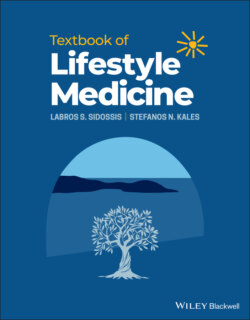Читать книгу Textbook of Lifestyle Medicine - Labros S. Sidossis - Страница 108
Take‐Home Messages
ОглавлениеA vegetarian diet is a dietary pattern based predominantly on plant‐origin products. Vegetarians exclude most meat (including fowl) and products containing meat.
Vegan diets are devoid of all flesh foods (such as meat, poultry, seafood, and their products). Other types of vegeterian diets are devoid of all flesh foods but may include egg (ovo‐vegetarain), fish (pesce‐vegetarian), dairy (lacto‐vegetarian), or combinations.
A well‐planned vegetarian diet, containing a variety of foods and food groups such as vegetables, fruits, whole grains, legumes, nuts, and seeds, can provide adequate nutrition.
However, the risk of specific nutrient deficiencies is real, especially in those who follow a vegan diet. The most common nutrient deficiencies are vitamins B12 and D, omega‐3 fatty acids, calcium, iodine, iron, and zinc, as these micronutrients are derived mainly from animal products.
Vegetarian diets are considered by some to be of higher diet quality compared to nonvegetarian diets due to their high content in dietary fibers, Mg, K, vitamin C and E, folate, carotenoids, and other phytochemical substances, and their low content in saturated fat, cholesterol, and sodium.
Vegetarian dietary patterns have been shown to reduce cardiometabolic risk, including the risk of developing T2DM, hypertension, and obesity, as well as cancer incidence and mortality from CVD.
